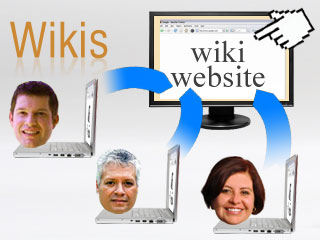Watch: Wikis in Plain English for an introduction to the concept of wikis.
 Wikis are web pages or groups of pages that are built by their contributors - readers who add, remove and edit content. This typically goes one of two ways - an open model where anyone (and we mean anyone) is invited to contribute or a closed model where a select group are invited to contribute. Either way, it is an exercise in collaboration and trust - whomever contributes is expected to meet certain standards of quality and accuracy and should expect, should they not reach these standards, that another participant will edit their contributions. The goal is to use a wiki to create a collaborative piece of information, sharing the knowledge of all contributors.
Wikis are web pages or groups of pages that are built by their contributors - readers who add, remove and edit content. This typically goes one of two ways - an open model where anyone (and we mean anyone) is invited to contribute or a closed model where a select group are invited to contribute. Either way, it is an exercise in collaboration and trust - whomever contributes is expected to meet certain standards of quality and accuracy and should expect, should they not reach these standards, that another participant will edit their contributions. The goal is to use a wiki to create a collaborative piece of information, sharing the knowledge of all contributors.The collaborative encyclopedia Wikipedia is the best known example of a wiki - anyone can participate in contributing and editing entries. Wikipedia does, however, employ staff who will freeze a topic if foul play is reported by readers. Errors and obvious fakes are often (though, not always) corrected very quickly.
Watch: Wikipedia Explained for an explanation of how Wikipedia works.
A common view as of 2010 in fields from medicine to technology and a range of social-cultural topics, is that Wikipedia is a valuable research resource and starting point for information and major news events, and articles in many areas are routinely accurate and informative, but users should take care – as with all general reference works – to check their facts and be aware that mistakes and omissions do occur (source).
Communities of interest
Wikis can be used for sharing knowledge in a community of interest, for example:
Workplace applications
Wikis can also be used in the workplace, for example the CIA developed Intellipedia - a collaborative intranet tool.
In Australia the Local Government & Municipal (LGAM) Knowledge Base just turned two years old.
The National Library of Australia has a thriving wiki on many of its collaborative efforts including Library Labs and Ask Now.
Discover: Take a look 3 or more of the wikis below.
- NSW State Library Readers' Advisory Services wiki
- Games and Public Libraries Wiki
- Antioch University's Staff Training and Support Wiki
- St. Joseph County Public Library's Subject Guides
- Montana History Wiki (Hint: follow the link to the Subject Guides)
- Twilight Saga Wiki (Well...I could have linked to Wookiepedia instead)
Create a blog post about your findings. What did you find interesting? What sort of information could your library put on a wiki - internal for staff only or external for customers to use and edit?
Explore: Still another variation in the world of wikis is where your wiki lives - you can install wiki software on a server at your institution (like we do with our website and email) or you can use a service that hosts the wiki for you. For this course we will be doing the latter - the WA Public Libraries Web 2.0 Basics wiki was set up with a wiki hosting service called Wetpaint.
Watch: Wetpaint Wikis in Plain English.
To add information or edit an existing entry in the WA Public Libraries Web 2.0 Basics wiki you will need to:
- Sign up for Wetpaint. When signing up, you can use the Gmail email address you created back in Week 2 of this course.
- Back on the WA Public Libraries Web 2.0 Basics wiki website you will need to click on the "Apply To Be A Writer" button. This ensures that only participants in this course are able to play with this wiki. You will receive an email as soon as you have been approved.
- After approval, look through the pages on the wiki, select one you wish to add to and click on the "Easy Edit" button above the page heading. Then go to it and add your information.
Again we are asking you to add at least 150 words somewhere on the site, as well as any images, new pages or editing you would like to do. Remember though, to play nicely.
Also remember to write your blog post (from the Discover section) and comment on at least five other participant blogs this week.
Next week: Tagging, Delicious and LibraryThing...
After numerous attempts to sign on,
ReplyDeleteI'm giving up,
because it just did not happen for me.
WIKI WORLD
ReplyDeleteThe Library has of course it's internal WIKI
which is very useful for connecting to the staff without using emails continuously. Have read the various comments on the WA Public library Web 2 Basic WIKI page, these included customer service, various programs, systems and technical aspects. Very interesting to read varied comments in these fields. Library blogging would be a great idea and probably well utilised.